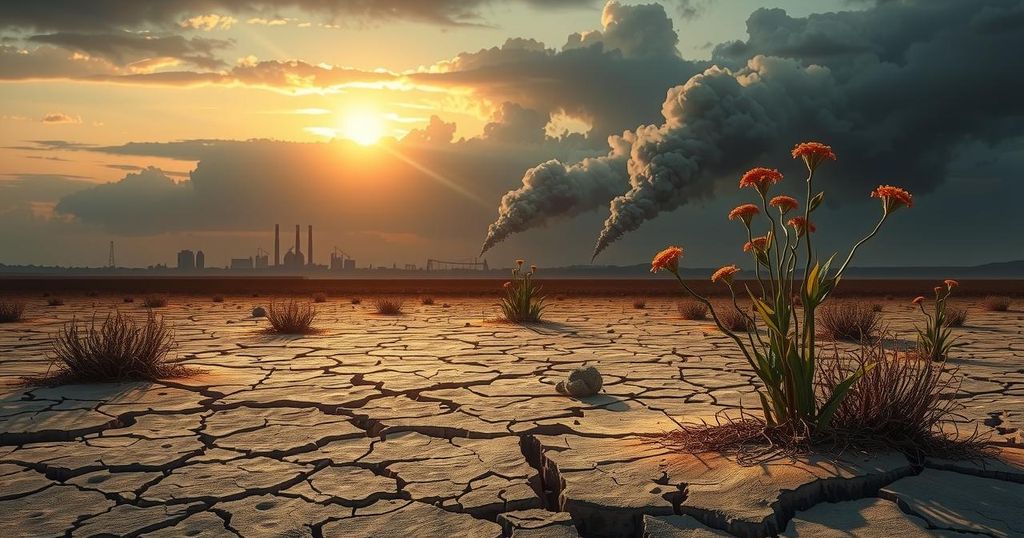Africa Faces Climate Crisis Consequences It Did Not Create

Africa, contributing only 4 percent of global emissions, is facing profound climate impacts that threaten its development. Despite this, adaptation costs are unattainable for many nations. Compounded by poor governance and a massive funding gap, Africa’s youth are increasingly protesting for accountability. To confront this crisis, a focus on governance reforms and strategic investments in resilience is essential.
Africa, despite being a negligible contributor to climate change, is subjected to its harshest effects, jeopardizing its development ambitions. Rich nations, responsible for the majority of emissions, continue to thrive while Africa suffers from a range of climate-related crises despite only emitting 4 percent of global carbon emissions. Adapting to these changes will require substantial financial resources, estimated between $30 billion to $50 billion per year, which remains beyond the means of many African nations.
Countries across the continent face numerous challenges including poor productivity, overwhelming debt, rising populations lacking job opportunities, poverty, and technological deficits, all compounded by fraught security conditions. As stated by Bola Ahmed Tinubu, President of Nigeria, balancing development with environmental protection within the context of climate action is daunting. Moreover, a populace projected to double by 2070 exacerbates the continent’s vulnerabilities, amidst scant foreign investment.
Africa’s struggle is underscored by the paradox of being richly endowed with natural resources while simultaneously facing the brunt of climate change. Unlike industrialized nations that benefited from growth without considering environmental impacts, Africa now grapples with the repercussions. Climate change has already imposed severe costs, resulting in a loss of 2-5 percent of GDP annually for the continent, with the majority of vulnerable nations being African.
Socio-political challenges complicate Africa’s circumstances, as youth-led protests against poor governance and economic mismanagement are becoming increasingly prevalent. Frustration among the young population is visible across many nations, including Nigeria and Kenya, calling for accountability and effective leadership. This discontent often translates into civil unrest, exacerbated by regional conflicts and governance failures, which deepen existing crises.
Experts like Sir Mo Ibrahim articulate the risks posed by unmet expectations of the youth, while underscoring the need for stable governance to build a resilient economy capable of tackling the climate crisis. In addition to external responsibilities, Africa must confront internal political dysfunction that hampers economic transformation and adaptation to climate threats.
The funding shortfalls for climate action in Africa are stark: developed nations have pledged resources that fall far short of the continent’s needs. The $100 billion target set for climate finance was only recently met, while the demands for adaptation and Nationally Determined Contributions (NDCs) remain immense. Ultimately, corruption and misallocation undermine efforts, with over $148 billion siphoned off into inefficiency each year, further aggravating the climate crisis.
To ameliorate these challenges, effective governance and resource management are vital. Emphasizing climate-smart agricultural strategies and renewable energy investments can bolster food security and resilience. To break the cycle of suffering, Africa must not only advocate for climate justice but also implement internal reforms that can empower nations to combat the climate crisis effectively.
The climate crisis poses a substantial threat to Africa, a continent that contributes minimally to global emissions but is predicted to suffer the most severe consequences. Despite the efforts and commitments made by African nations like Nigeria regarding climate action, the overwhelming challenges stemming from poverty, underdevelopment, and political instability hinder their ability to cope with climate change. Moreover, while developed nations have made pledges to support climate initiatives, these promises often fall short, exacerbating Africa’s plight. As populations swell and economic conditions continue to be strained by external and internal factors, the need for urgent climate adaptation and sustainable practices has become paramount. Youth frustrations manifesting in protests illustrate a mounting desire for accountability and better governance, which are essential for addressing both climate change and socio-economic stability. Thus, understanding and addressing both the historical and ongoing injustices surrounding climate funding, along with improving governance, is critical for Africa’s capacity to confront the climate crisis.
In conclusion, Africa stands at a precarious intersection of climate vulnerability and developmental aspirations, challenged by both external historical injustices and internal governance failures. To mitigate the adverse impacts of climate change, Africa must prioritize effective governance, transparency, and investment in resilient practices. While international support is necessary, internal reforms and strategic planning are crucial for empowering the continent in its response to the climate crisis it did not create but cannot escape.
Original Source: businessday.ng






